People over 80 will be able to stretch out their arms from Monday March 14 to receive a fourth injection of the vaccine against Covid-19. As the government prepares again to lift certain health restrictions, Prime Minister Jean Castex announced on Saturday, in a interview at the Parisian, that people aged “over 80 who have received their booster dose for more than three months”, but also immunocompromised people will be able to receive this new injection from Monday. For the Prime Minister, this measure should make it possible to better protect these publics “faced with a loss of immunity”.
The injection of a new booster dose for those most vulnerable to the virus had been considered for a long time, but the epidemic context today seems to have convinced the government to move up a gear. On Saturday, Jean Castex conceded a “resumption of cases”, without however considering a postponement of the lifting of restrictions. While the curve of new cases has been falling sharply for several weeks, contaminations have rebounded for several days, but have remained stable in 24 hours at 72,443 new daily cases. “The scientific council, which I have requested, tells us that it is above all the BA.2 sub-variant which is at the origin of this” epidemic rebound, explained the Prime Minister, referring to this variation of the Omicron strain .
Monday will mark the end of wearing a mask in closed places (with the exception of public transport and health establishments) and the transformation of the vaccination pass into a health pass – a test will now allow entry into the premises who were then subject to proof of vaccination. These new relaxations are cause for concern for certain particularly vulnerable populations, including immunocompromised people, who cannot be protected by vaccination, but also the elderly, in whom the protection conferred by injections decreases longer than in the general population.
“The announcement of these booster injections is certainly linked to the increase in new infections and the lifting of restrictions, it is necessary to put in place countermeasures to reassure fragile people”, confirms to L’Express Jean-Daniel Lelièvre, head of the immunology department at the Henri Mondor hospital in Créteil and member of the technical commission for vaccination with the Haute Autorité de santé (HAS).
Declining immunity in the elderly
Few data are currently available on the importance of a fourth dose of vaccine in the elderly. In several countries, such as Israel, vaccination campaigns for a second booster have already begun. British health authorities have also announced at the end of February that a new “boost” would be offered to people over 75 in the spring. They also explained that this campaign was a “precautionary” measure and did not mean that there was a danger to the health of these people. “We do not have definitive data on the interest of this fourth dose for people over 80, but we know that these are the populations most at risk”, concedes Jean-Daniel Lelièvre. Data observed in the elderly showed that immunity waned from three months after the third injection.
In its opinion of January 19 on the advisability of setting up a second booster dose of vaccination, the Council for the Orientation of the Vaccine Strategy noted that with regard to hospitalizations, the first British data show that the protection conferred by the booster in people aged over 65 remains at 94% from two to nine weeks later and 89% more than ten weeks later. A small drop, yes, but it could be improved quickly with a booster.
If this fourth dose concerns the over 80s, it should not be extended to the general population immediately, assures Jean-Daniel Lelièvre. In its opinion of 19 January last on the advisability of implementing a second booster dose of vaccination, the Council for the Orientation of the Vaccine Strategy noted that “in the short term, the implementation of a second vaccine booster dose would only concern people who received their first booster in September and October”, restricting “in fact the target to the elderly, vulnerable people and health personnel”.
The issue of public acceptance
But it seems above all that protection against serious forms, and therefore against hospitalization and mortality, remains very strong after three doses in the general population. “With the variants that we currently observe, this protection against severe forms is durable and is supposed to last for a very long time”, assures the immunologist. This partly relies on another level of immunity, called cellular immunity. “This response is very little impacted by the Omicron variant”, he explains. However, this protection, which is based on the B and T lymphocytes, plays an important role in restarting the production of antibodies during an infection or a new dose of vaccination.
The very large part of the population affected by the Omicron variant from the end of November 2021 could thus also play a role in whether or not this new booster dose is extended to the entire population. The COSV thus wrote in January that “in the current context of very high circulation of the Omicron variant, the population could have developed sufficient protection to fight against future variants, which would attenuate the need for a second vaccination booster dose in the population. general”. “We know from an immunological point of view that a fourth dose will make it possible to raise the level of antibodies, but in terms of public health this is not necessarily justified”, underlines Jean-Daniel Lelièvre.
A large booster vaccination campaign would only be justified if the drop in protection from previous doses proved to be real, which is not the case today. “There are also considerations of acceptance by the population because despite the third dose people become infected, and this new injection will then have to be perfectly justified”, assures the HAS expert. In the meantime, the doctor suggests strengthening “other forms of protection for subjects at high risk, with monoclonal antibodies for immunocompromised people, and research on treatments”.
